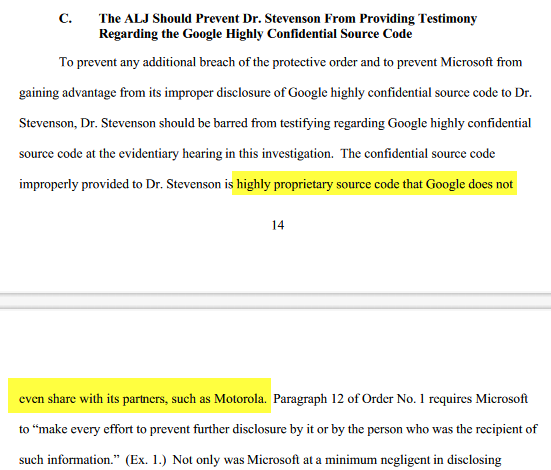Google's "highly proprietary source code": unfair edge for Motorola?

Licensing operating systems to hardware partners is a tricky business. Google’s announcement this week that it plans to buy Motorola Mobility is a tacit admission that the partnership thing just isn’t working out for them. Android might be selling lots of phones (and a few tablets too), but the ecosystem is a mess, the Android reputation isn’t exactly stellar, and Google isn’t making nearly enough revenue per phone.
In “Android isn’t free,” Farhad Manjoo of Slate predicts that "this deal will represent a turning point in how Google operates Android."
Today, the platform is "open" but chaotic—because phone-makers get the software for free and can do whatever they want with it, Android is available on some good phones as well as lots and lots of cheap, bad ones. In the aftermath of this deal, Google will seek to exert greater influence over hardware companies.
And it will be able to exert the greatest influence of all over the company it owns. Buying a hardware company means Google gets to build Android and its phones in sync. Tablets, too—if this merger goes through, the Motorola Xoom will become a Google device.
Google is buying a company with 19,000 employees that sells more than 10 million phones every year (although fewer than half of those are smartphones). A Google phone or tablet manufactured by Motorola will have unfair advantages right out of the gate.
Such a phone will almost certainly be set by default to use Google services and will also steer traffic exclusively to Google’s sites. There’s no guarantee other handset makers will be as loyal to Google—at least not without some cash in exchange for setting the right default services. Google can even sell its phone at or below cost if it knows it can make a higher amount through the ongoing revenue stream.
But the biggest advantage of all is technical. The engineers who work on those new phones and tablets made by Google subsidiary Motorola will have access to “highly proprietary” parts of Android that Motorola engineers don’t see now.
Google admitted as much last week in a legal document it filed with the International Trade Commission in Washington, D.C. Microsoft is the complainant in that case, accusing Motorola of patent infringement in a case that involves “Certain mobile devices, associated software, and components thereof.”
Although Android isn’t mentioned in that title, the Android source code is the star of the investigation. Experts on both sides are looking at it. Last week Google filed a Motion for Sanctions against Microsoft, arguing that Microsoft had improperly shared “highly proprietary source code that Google does not even share with its partners, such as Motorola.”

In its motion, Google argues that it must keep Microsoft from “gaining advantage” from this source code. So how do Samsung, HTC, LG, and Sony Ericsson feel about a direct competitor getting access to code they can’t share?
I can't imagine that Google will build a wall between its hardware arm and the keepers of its Android source code, unless they're forced to do so. The financial and technical advantages of combining hardware and software design forces are significant. The urge to merge them fully would be irresistible.
Under the circumstances, I don’t see how the existing partner relationships that Google has built can survive. The best case scenario is that they are severely weakened. My guess is that all four of those recently demoted Android partners are polishing the language in their antitrust complaints right now.
Most of the speculation I’ve seen so far says this merger should pass regulatory muster pretty easily. I wonder if the question of source code could be a bigger obstacle than some people think.
Update: Apparently some commenters don't believe that the source code under discussion is related to Android. Yes, it is. Here is the description of the legal action, taken from Motorola's annual report to the SEC (Form 10-K), under the heading "Patent-Related Cases":
Microsoft Corporation v. Motorola, Inc.
On October 1, 2010, Microsoft Corporation (“Microsoft”) filed complaints against Motorola, Inc. in the International Trade Commission (“ITC”) and the United States District Court for the Western District of Washington (“District Court”) alleging patent infringement based on products manufactured and sold by Motorola, Inc. The ITC matter is entitled In the Matter of Mobile Devices, Associated Software, and Components Thereof (Inv. No. 337-TA-744). On October 6, 2010 and October 12, 2010, Microsoft amended the District Court and ITC complaints, respectively, to add Motorola Mobility, Inc. as a defendant. The complaints, as amended, allege infringement of claims in nine patents based on Motorola, Inc.’s and Motorola Mobility, Inc.’s manufacture and sale of Android-based mobile phones. [emphasis added]
The Google source code was delivered under subpoena and is directly related to the "Android-based mobile phones" described in the complaint.
Update 2: The ITC administrative law judge has denied Google's motion, according to Reuters. The judge's decision was, in fact, sharply critical of Google:
The ground rules in the case, in which just about everything is (frustratingly) shielded by the confidentiality order, say that any party that objects to another’s use of confidential materials has to make a good-faith effort to resolve the dispute, and then must wait two days before filing a motion for sanctions. “The ALJ finds no basis to discern from Google’s statement whether Google made a reasonable, good-faith effort to resolve the matter with Microsoft,” Judge Essex wrote. “The ALJ notes to Google failed to attach the Warren email to its motion and it is unclear whether Google even notified Microsoft of its intention to file the instant motion.”
As a result, Microsoft's expert witness will be allowed to testify about the source code associated with Motorola's Android devices.